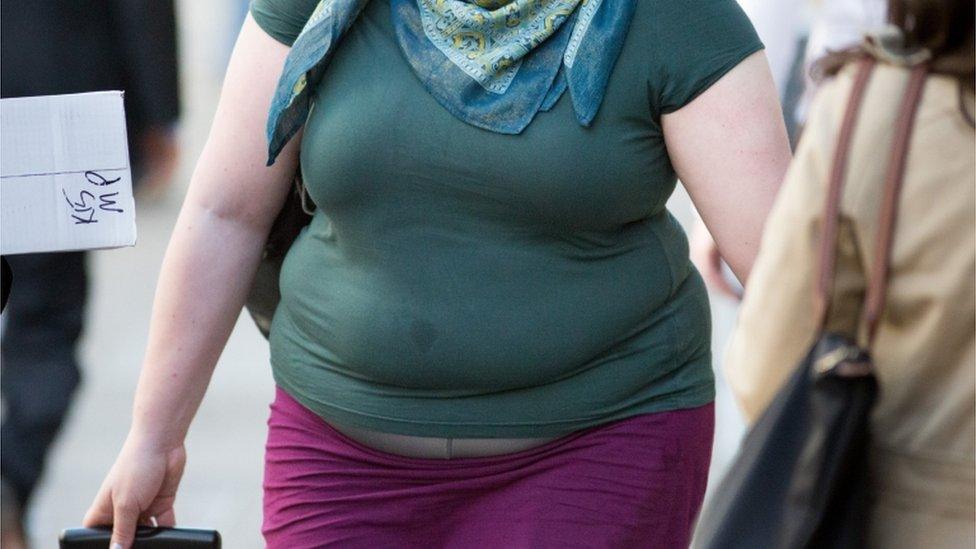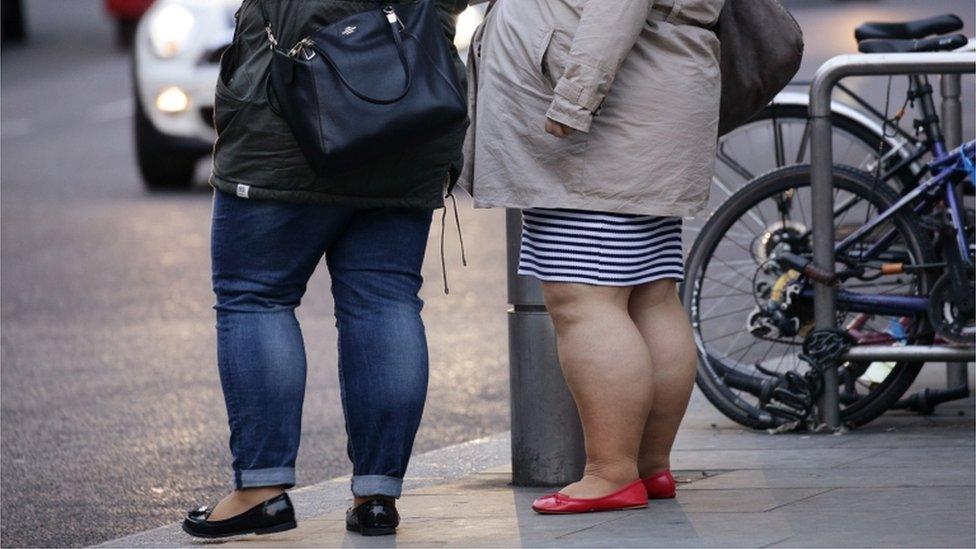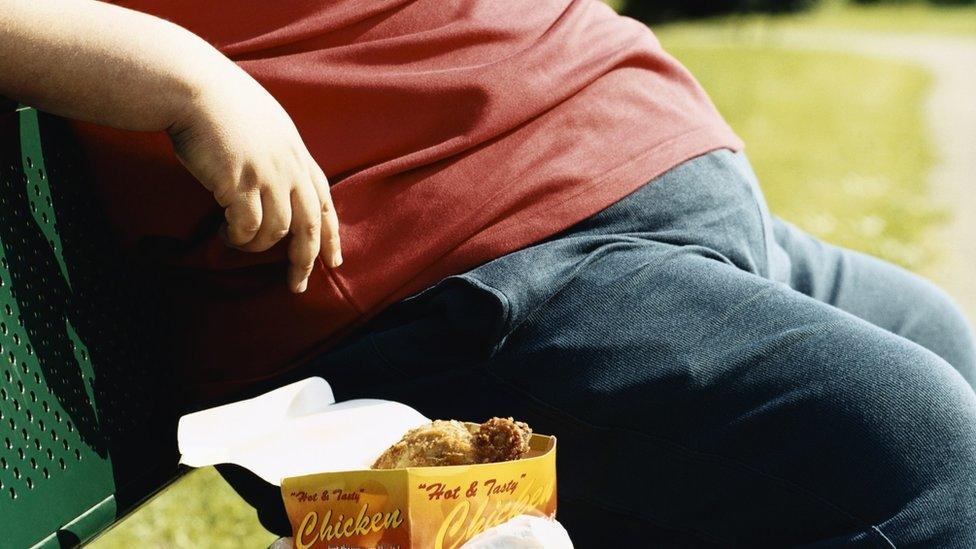Obese patients 'surgery ban' in York to be reviewed
- Published
- comments

A move that could have seen obese patients refused surgery in an attempt to save money is to be reviewed after national NHS bosses intervened.
A proposed restriction by the NHS Vale of York Clinical Commissioning Group would have seen non-life threatening procedures delayed by a year for those with a body mass index exceeding 30.
The rule would also apply to smokers.
NHS England, which can intervene as the CCG is under special measures, said the group had agreed to rethink the move.
Under the move, obese patients in the Vale of York area could have secured a referral in less than a year if they shed 10% of their weight.
Similarly, if smokers refused to quit they would face having procedures delayed for up to six months, which could be accelerated if they stopped smoking for eight weeks.
The CCG said the proposals, announced as part of a package of measures being considered to reduce costs, came at a time when the local system was under "severe pressure".
The new rules would only apply to elective surgery for non-life threatening procedures, for example hip and knee operations.
'No blanket bans'
But a spokesman for NHS England said: "Reducing obesity and cutting smoking not only benefits patients, but saves the NHS and taxpayers millions of pounds.
"This does not and cannot mean blanket bans on particular patients such as smokers getting operations, which would be inconsistent with the NHS constitution."

There were 14.5 million obese people in the UK in 2014, a study showed
Chris Hopson, the head of NHS Providers representing acute care, ambulance and community services, said he was worried about plans such as this being made.
NHS bosses now believed they had reached the point at which the health service was simply being asked to deliver too much for the funding that was available, he told BBC Radio 4's Today programme.
He said rather than commissioning groups making "piecemeal decisions", there should be a national debate about the future of the healthcare system.

Analysis by Robert Pigott, BBC health correspondent
When front-line health services revealed a deficit of £460m for the first three months of the financial year, hospital trusts said it was time for a national debate about what the NHS could now afford to do if it were to remain free.
Although it is now under review, the proposal by the Vale of York Clinical Commissioning Group to exclude obese people and smokers from non-emergency surgery has started that debate in earnest.
The CCG estimates obesity cost the NHS in the Vale of York £46m in 2015, but is it right to target obese people to bring costs down?
There is a clinical rationale. Obese patients suffer more complications during and after surgery than those of "normal" weight.
Despite this, some might see the decision as sending a signal of disapproval to those who are overweight.
The implication could be that being overweight is a personal lifestyle choice, adopted at the expense of the wider community.
Obesity has been linked with being poorer, and living in so-called "obesogenic" environments, where unhealthy, fattening, food is easier to get than more expensive, healthy, alternatives.
It is often hard to lose weight to which the body has adapted itself, and delaying operations on hips and knees might further limit the prospect of success.
The proposal could have benefited obese people as well as the health service if it succeeded in persuading them to lose weight.
Whatever the rights and wrongs of the Vale of York approach, it does, in effect, suggest a revised contract with patients - a new deal that requires people to take reasonable steps to preserve their own health, rather than expecting the NHS to pick up the pieces.

Shaw Somers, a bariatric surgeon based in Portsmouth, said it was a fairly logical step to save money, but was short-term and discriminatory.
"Obesity is an illness and for these people, they are not deliberately waking up each morning thinking 'how do I stay fat?'," he told the Today programme.
"They are trying to lose weight in the vast majority of cases and to deny them treatment that they need on the basis of their weight, without then offering them effective help to help them lose weight is rather like discriminating [against] a segment of the population on the basis of their colour or religious persuasion."

Body Mass Index
Body mass index (BMI) is used to calculate whether a person is underweight, a healthy weight, overweight or obese for their height
It is calculated by dividing someone's weight in kilograms by the square of their height in metres
Generally the higher your BMI, the greater your risk of a large range of medical problems
A BMI above 30 is medically classified as obese
Some doctors say it can be inaccurate if you're an athlete or very muscular

The Royal College of Surgeons (RCS) described the proposed restrictions as "some of the most severe the modern NHS has ever seen".
Clare Marx, RCS president, said: "Smokers and overweight patients should unquestionably be helped to stop smoking or lose weight prior to surgery for their overall health.
"We would support any attempts by Vale of York to expand its weight loss and smoking cessation programmes, but introducing blanket bans that delay patients' access to what can be life-changing surgery for up to a year is wrong."
A major study of the global obesity problem by Imperial College scientists found there were 6.8 million obese men in the UK in 2014, and 7.7 million obese women.
Former health minister Norman Lamb said: "This is just the latest in a growing list of local decisions to ration care - any rationing not based on clinical need is outrageous."
A statement from the Vale of York Clinical Commissioning Group said: "NHS England has today asked us to review the draft approach, which we will now do, and will hold off implementing anything until we have an agreed way forward.
"We will ensure any plans are implemented in line with national guidance, are in the best interests of our patients and are clinically robust."
It said the group wanted to support work to help people in the community to stop smoking and, where needed, lose weight.
Clinical Commissioning Groups were introduced in 2013 and became responsible for commissioning or buying local health and care services but are overseen by NHS England, external, a national body formed by the same parliamentary act.

What do you think about this plan? Would this decision affect you? You can email haveyoursay@bbc.co.uk, external with your comments.
Please include a contact number if you are willing to speak to a BBC journalist. You can also contact us in the following ways:
Whatsapp: +44 7525 900971
Send pictures/video to yourpics@bbc.co.uk, external
Tweet: @BBC_HaveYourSay, external
Send an SMS or MMS to 61124 or +44 7624 800 100
- Published18 July 2016

- Published14 June 2016

- Published1 April 2016
